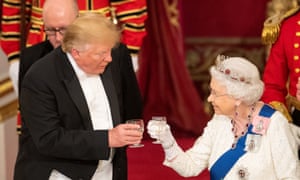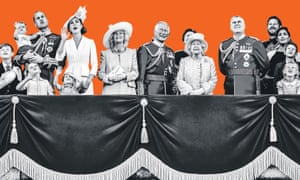‘Trump’s appearance highlighted that the monarchy has made itself virtually impregnable and that the republican cause in Britain has rarely been weaker.’ Composite: AFP/Getty Images/Guardian design
From Harry Truman to Donald Trump, there have been 13 US presidents since the Queen came to the throne in 1952, so she has plenty of practice in hosting a state visit for the world’s most powerful man. Unsurprisingly, Trump loved the British establishment making a fuss of him – from the 41-gun salute to the British lamb washed down with vintage claret at the Buck House white-tie banquet. Both Downing Street and the White House considered the trip a great success, with talk – wildly premature – of a giant Anglo-American free trade deal.
But the real winner from the visit was not a lame duck Theresa May or Trump – who quickly moved on to other things – but the royal family. There was widespread praise for the way in which the Queen handled Trump, even using her speech at the banquet to big up the international institutions he so frequently derides. The occasion also showcased one of the UK’s few world-class industries: heritage. Tourists are money, as someone once said.
But there was more to it than that. Trump’s appearance highlighted that the monarchy has made itself virtually impregnable and that the republican cause in Britain has rarely been weaker.
Things looked rather different a couple of decades ago. When Princess Diana died in a Paris car crash in 1997, the Queen seemed ill-prepared for the national blubathon that followed. Her initial response to her daughter-in-law’s death was seen as cold and insensitive and – after what today would be called a social media storm – she was forced to go in front of the cameras to quell the public outrage.
Tony Blair, newly arrived as prime minister, was seen to have better captured the public mood with his depiction of Diana as the “people’s princess”. More significantly, Blair’s government was committed to a package of constitutional reforms, including devolution for Scotland and Wales. This created the opportunity to have a debate about whether Britain could really be modernised if it remained a monarchy.
As it happened, Blair was a royalist and would never have countenanced the idea of turning Britain into a republic, but that didn’t prevent the idea being canvassed. In 2000, this paper called for a referendum on what sort of head of state Britain should have after the Queen’s death. “People ought to be able to say whether they would prefer to have an elected head of state or to continue with a monarchy. Do they want to be citizens or subjects?” we asked.
The arguments in favour of turning Britain into a republic are no different from what they were 19 years ago. They involve democracy, power, governance, class and distribution of wealth. It is difficult, if not impossible, to have a proper discussion about tackling inequality while leaving the monarchy out of the equation. But in 2000 there was a realistic possibility of change. The royal family was rather like one of those long-established high street businesses that have fallen on hard times as a result of the retail revolution. The product looked a bit out of date; those in charge of running the business were old and stale; customers seemed less happy with the service they were getting.
But since then, two things have buttressed the monarchy’s position. First, external events have been helpful. At the turn of the millennium, the world economy was in the middle of a long boom marked by rising living standards, low inflation and falling unemployment. The absence of an economic crisis created the political space to think about other issues. But since 2007, Britain has been in a semi-permanent state of economic and political crisis, with the deep recession of 2008-09 followed by post-2010 austerity and Brexit. Even had there been a growing drumbeat of support among voters for a republic, Westminster would have had other priorities.
From Harry Truman to Donald Trump, there have been 13 US presidents since the Queen came to the throne in 1952, so she has plenty of practice in hosting a state visit for the world’s most powerful man. Unsurprisingly, Trump loved the British establishment making a fuss of him – from the 41-gun salute to the British lamb washed down with vintage claret at the Buck House white-tie banquet. Both Downing Street and the White House considered the trip a great success, with talk – wildly premature – of a giant Anglo-American free trade deal.
But the real winner from the visit was not a lame duck Theresa May or Trump – who quickly moved on to other things – but the royal family. There was widespread praise for the way in which the Queen handled Trump, even using her speech at the banquet to big up the international institutions he so frequently derides. The occasion also showcased one of the UK’s few world-class industries: heritage. Tourists are money, as someone once said.
But there was more to it than that. Trump’s appearance highlighted that the monarchy has made itself virtually impregnable and that the republican cause in Britain has rarely been weaker.
Things looked rather different a couple of decades ago. When Princess Diana died in a Paris car crash in 1997, the Queen seemed ill-prepared for the national blubathon that followed. Her initial response to her daughter-in-law’s death was seen as cold and insensitive and – after what today would be called a social media storm – she was forced to go in front of the cameras to quell the public outrage.
Tony Blair, newly arrived as prime minister, was seen to have better captured the public mood with his depiction of Diana as the “people’s princess”. More significantly, Blair’s government was committed to a package of constitutional reforms, including devolution for Scotland and Wales. This created the opportunity to have a debate about whether Britain could really be modernised if it remained a monarchy.
As it happened, Blair was a royalist and would never have countenanced the idea of turning Britain into a republic, but that didn’t prevent the idea being canvassed. In 2000, this paper called for a referendum on what sort of head of state Britain should have after the Queen’s death. “People ought to be able to say whether they would prefer to have an elected head of state or to continue with a monarchy. Do they want to be citizens or subjects?” we asked.
The arguments in favour of turning Britain into a republic are no different from what they were 19 years ago. They involve democracy, power, governance, class and distribution of wealth. It is difficult, if not impossible, to have a proper discussion about tackling inequality while leaving the monarchy out of the equation. But in 2000 there was a realistic possibility of change. The royal family was rather like one of those long-established high street businesses that have fallen on hard times as a result of the retail revolution. The product looked a bit out of date; those in charge of running the business were old and stale; customers seemed less happy with the service they were getting.
But since then, two things have buttressed the monarchy’s position. First, external events have been helpful. At the turn of the millennium, the world economy was in the middle of a long boom marked by rising living standards, low inflation and falling unemployment. The absence of an economic crisis created the political space to think about other issues. But since 2007, Britain has been in a semi-permanent state of economic and political crisis, with the deep recession of 2008-09 followed by post-2010 austerity and Brexit. Even had there been a growing drumbeat of support among voters for a republic, Westminster would have had other priorities.

‘There was widespread praise for the way in which the Queen handled Trump.’ Photograph: Pool/Reuters
But while this was happening, the House of Windsor provided other struggling businesses with a masterclass in how to reinvent themselves. First, it understood that the underlying strength of the brand meant there was no need to panic. Britain has always tended to be a conservative country wary of radical change, which is one of the reasons the vote to leave the EU came as such a surprise in 2016. Despite all its problems in the 1990s – including the bitter divorce between Prince Charles and Diana, and the row over the Queen’s tax bill – there was always strong residual support for the monarchy. Had there been a referendum in 2000 on whether to have an elected head of state, it would almost certainly have gone in favour of the status quo.
Second, there was a change in the management team, with the older members of the royal family being replaced in the public spotlight by William and Harry. This was a smart move. The Windsors didn’t want to end up with all its most avid supporters gradually dying out: it saw the need to appeal to a younger audience.
If that meant embracing social media then so be it; the royals embraced new technology. Whereas previous royal babies have been announced through the mainstream media, the Duke and Duchess of Sussex announced the birth of their son on Instagram.
Third, the royals have had the nous to avail themselves of the best image consultants and PRs that money could buy. The idea has been to show that the new generation of royals – William and Kate, Harry and Meghan – have the same commitment to public duty as the Queen, but with a bit more of the touchy-feely empathy demanded today.
If it all seems to have worked, that is in large part due to the weakness of the competition. Persuading Britain to dispense with the monarchy would be tough in any circumstances. Persuading Britain to choose a replacement for the Queen from the current crop of politicians, tarnished as they are by economic torpor, the expenses scandal and Brexit, would be a complete non-starter.
In his diaries, Tony Benn describes watching the establishment gather for the service in St Paul’s cathedral to mark the Queen’s silver jubilee in 1977. “We haven’t removed the grip of this crowd from British society, far from it, but on the other hand the public accepts it all and the press plays it up to divert people from unemployment and the cost of living and the EEC and so on. It is a very important ingredient in British life and it has to be thought about.”
It certainly does need thinking about, but there will be no referendum on the monarchy’s future any time soon. There was no mention of republicanism in Labour’s 2017 election manifesto and it’s hard to envisage the next one being any different. As things stand, it would be electoral suicide.

No comments:
Post a Comment